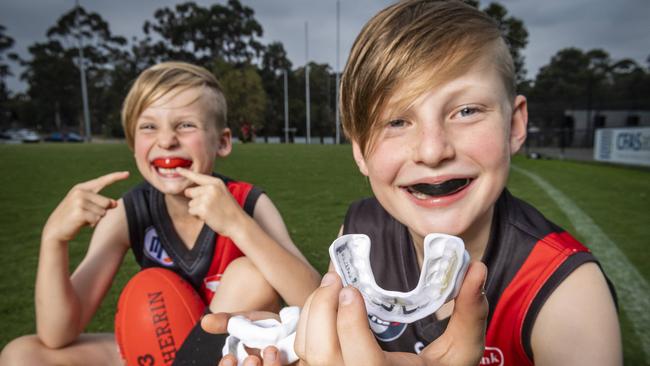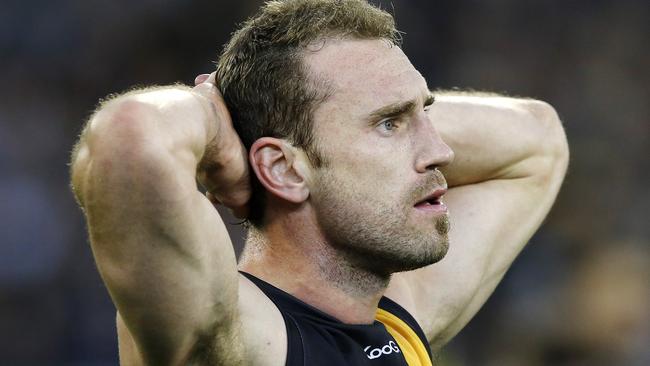Mark Robinson: HitIQ mouthguard technology to help footy change game on concussions
After an AFL trial, new mouthguard technology that monitors head knocks and is backed by James Hird will be available to every footballer in the country.

AFL News
Don't miss out on the headlines from AFL News. Followed categories will be added to My News.
Revolutionary mouthguards fitted with hi-tech chips to monitor head knocks are planned to be made available to the football community within two years.
The AFL started trialling the data chip in 2019 and it is now being used by half the players across the league.
By the end of the year, the groundbreaking concussion technology will be available to every player, and is expected to be provided to AFLW players by next year.
Watch the 2021 Toyota AFL Premiership Season. Every match of every round Live on Kayo. New to Kayo? Try 14-Days Free Now >
In a huge leap forward for community football, the mouthguard device is expected to be rolled out for all grades, including juniors, by 2023.
The custom-made mouthguard costs up to $500 but the AFL will discuss making it more affordable at grassroots levels with developer HitIQ.
The mouthguard is moulded to fit a player’s teeth, with a sensor chip inside it.
The chip logs head knocks, including acute impacts and the subconcussive accumulation of the hits.
The AFL has, this year, injected cash into a broader rollout of the technology after two years of trials, which initially involved four clubs.
The aim is to give players, medicos, clubs and the AFL data to help diagnose athletes with concussions and brain injuries, and rehabilitate them.


Mike Vegar, managing director of HitIQ, said: “What we’ve been able to do with the mouthguard is effectively turn it into a sensor device.
“We’re able to identity and monitor every single head impact that the players experience.
“What we’re delivering to the AFL is a prodigious asset, which is a big database of head impacts, which ultimately will further inform a better standard of care for the athletes.
“There are going to be so many insights that come out of this data set — and ultimately it’s going to be a great outcome for the athlete.”
About 400 AFL players already wear the chip system.

Included among investors in the HitIQ project is Essendon great James Hird. The AFL has committed $1m a year over a decade for further concussion studies and projects.
AFL general counsel Andrew Dillon said the mouthguard project would provide valuable data to the league and concussion experts.
“The partnership with HitIQ and the data we can get from the mouthguards will be extremely important in furthering our research in this area,” Mr Dillon said.
“The uptake from clubs and players has been really encouraging and we are committed and intrigued to find out what the data will tell us over the coming seasons.
“The partnership and study will complement our continued action in this space over recent years including strengthening of the match-day protocols and amendments to the Laws of the Game to discourage high contact.”


Concussion is the single greatest concern at all levels of football. The deaths of Danny Frawley and Shane Tuck have led to a greater focus on head trauma and its association with the brain disorder chronic traumatic encephalopathy.
The four clubs involved in the 2019 trials were Essendon, St Kilda, Carlton and Western Bulldogs.
The technology has also been trialled in the NRL, including with players from Melbourne Storm.
Eight AFL clubs agreed to be part of the trials in 2020.
The AFL Players’ Association supported the mouthguard trials across 2019-20.
“Through recent club visits, we have encouraged all players to participate in 2021,” AFLPA executive James Gallagher said on Tuesday.
“This project is an opportunity to learn more about the connection between head impacts in football and concussion, using objective data.
“Importantly, the use of these mouthguards will generate data associated with all head knocks, not just those that result in a diagnosed concussion.
“We are also pleased that AFLW players will have access to the mouthguards from next season.”
Father of two and junior football medic Ashley Mai, whose sons Jonah, 10, and Harper, 8, play for Eltham Junior Football Club, welcomed the technology, saying he was concerned about kids suffering head knocks.
“Having something to give you feedback is fantastic,” he said.
“I think the technology is really good, especially being a medic myself and having to deal with head knocks during footy games.”
More Coverage
Originally published as Mark Robinson: HitIQ mouthguard technology to help footy change game on concussions




